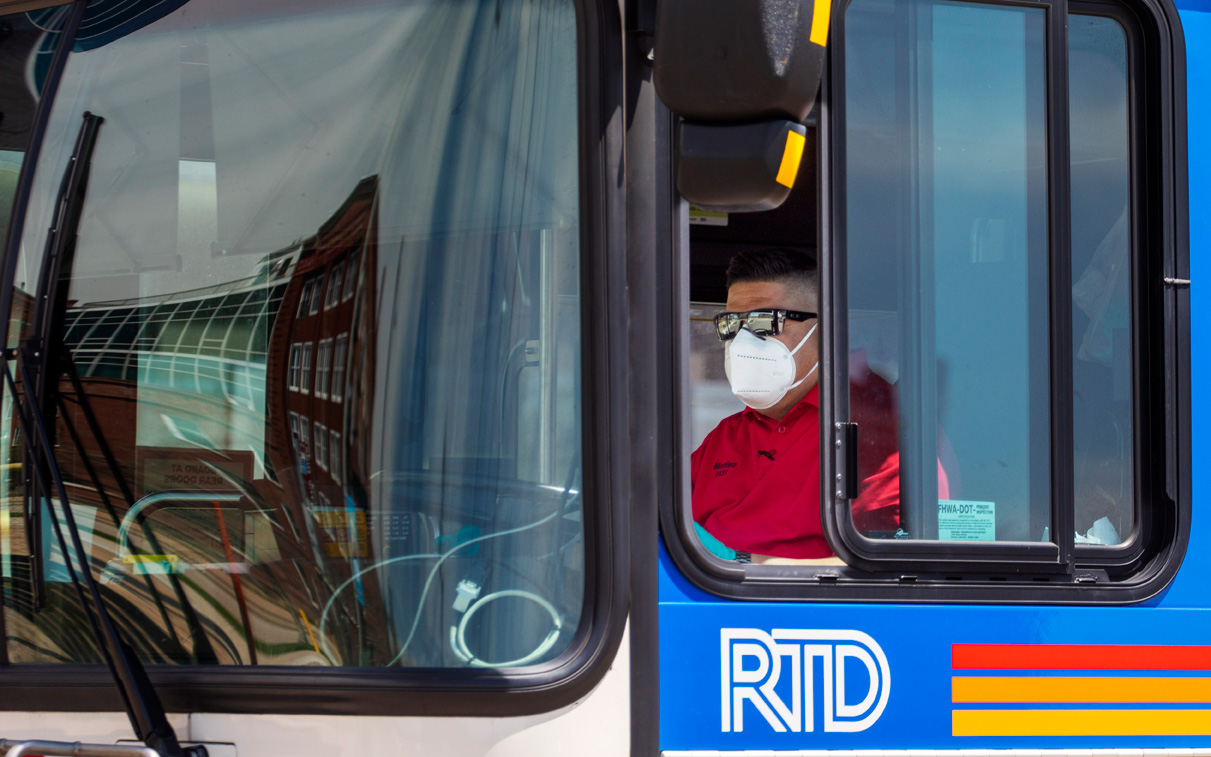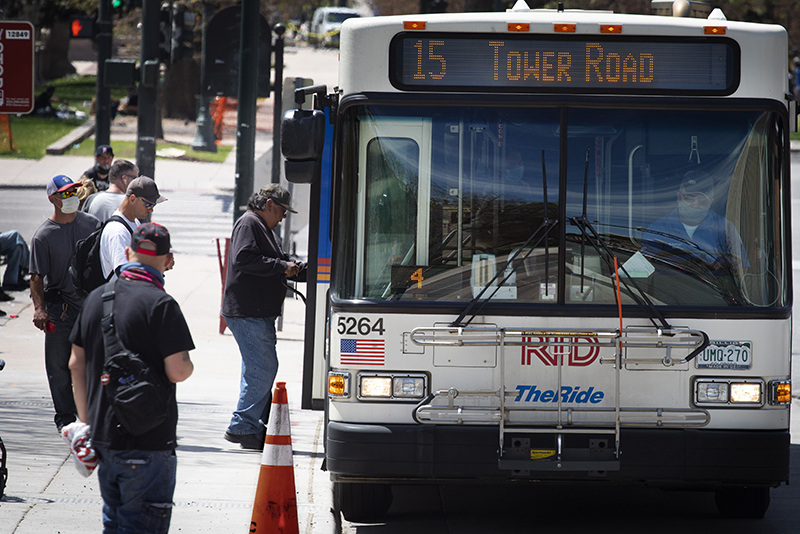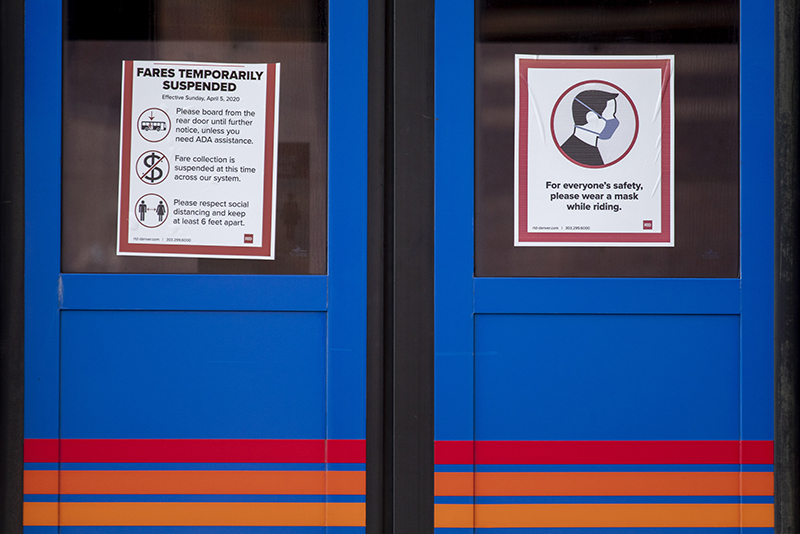
RTD driver Chris Morales in his bus on May 6, 2020. Photos by Joe Mahoney/Special to The Colorado Trust
RTD driver Chris Morales in his bus on May 6, 2020. Photos by Joe Mahoney/Special to The Colorado Trust
By Daliah Singer
Chris Morales has been a bus driver for the Regional Transportation District for 16 years. The 50-year-old runs route 43 from the Metropolitan State University of Denver campus east to Stapleton. He’s committed to his work and wants to do it well.
But for the first time in nearly two decades, as the coronavirus sweeps through Colorado and the country, Morales feels he’s putting his life at risk in order to do so.
“I’m scared every day I go to work,” he said.
Since Colorado’s stay-at-home order went into effect on March 26, RTD has responded by reducing service, requiring rear-door boarding, eliminating fares and providing some personal protective equipment to operators. But employees, advocates and the transit union say RTD has acted too slowly and that its responses aren’t nearly enough to keep employees and the public secure. As the state begins “Safer-At-Home”—Gov. Jared Polis’ selective relaxing of his statewide COVID-19 policies (stricter policies remain in place in Denver until May 8)—these same workers are concerned that their safety will be further compromised as more people return to using public transportation.
“Health care workers, I understand they’re on the front line, but we’re also on the front line every day,” said Fern Cole, a bus driver who’s contracted to drive RTD buses through the transportation company Transdev North America. “So why are we not just as important as them? I’m putting my life on the line every day.”
As of May 5, nine RTD employees had tested positive for COVID-19, with eight already recovered and back at work, said Marta Sipeki, RTD’s senior manager of public relations and engagement. That figure does not include cases among contract workers like Cole.
Transit workers are a higher-risk population. They tend to be older and their sedentary jobs can lead to health issues such as hypertension, diabetes and other chronic or underlying health conditions. According to a presentation given by the RTD Market Research Team to the agency’s board of directors in February, the largest segments of RTD’s bus and rail operators are between the ages of 56 and 74 (43% and 35%, respectively) and they’re overwhelmingly male (56% of the coronavirus deaths in Colorado have occurred among men). Thirty-five percent of bus drivers are Black, a community that’s dying of COVID-19 at disproportionate rates in Colorado and nationwide.
RTD employees are also considered essential workers.
“There is still a pretty sizeable transit-dependent population,” said Andrew Goetz, PhD, a professor and faculty member in the University of Denver Transportation Institute. “That includes many workers who are required in front-line positions right now: people working at hospitals, people working at grocery stores, people in all different occupations that are still open and still needed. That’s why public transit is still really important during this time—maybe more important.”
As COVID-19 cases began to emerge in Colorado, RTD stated on March 23 that it would “maintain current transit service levels” during Denver’s stay-at-home order. It wasn’t until April 5 that fare suspension and rear-door boarding took effect, both efforts to limit interactions between drivers and patrons.
“We provide a vital lifeline to a lot of people, so we want to make sure we’re able to get those people to the places they need to go,” Sipeki said. “The main thing is to make sure that all of our employees and passengers stay safe. Whatever we implement, that’s always number one.”
On Sunday, April 19, RTD initiated a 40% service reduction plan that switched most bus and rail lines to weekend service. The changes went into effect three weeks after the agency’s board of directors approved them. (A service change was already scheduled to begin in May in response to an operator shortage.)
Sipeki said the process was sped up as much as possible, but there was a lag because “doing a service change is really a major undertaking.” Drivers have to vote on the different routes; discussions with the union must be had; and digital schedules at stations have to be updated.
“Could we have done it faster? If we could have, we would have,” she said.
Union representatives are urging RTD to do even more to keep people safe and to be more proactive about the process. They want to see free testing for symptomatic transit workers; the addition of pandemic leave and hazard pay; and more personal protective equipment, among other requests.
“There is still so much lacking,” said Yvette Trujillo, international vice president of Amalgamated Transit Union, the largest union representing transportation workers in the U.S. and Canada. The group has nine local unions in Colorado, two of which are in Denver, where Trujillo is based.
“We told RTD early on they should have taken a strategic approach to continuation of service to avoid overcrowding. RTD’s decision to go to a Saturday schedule was just an easy way out,” Trujillo said. “We hope they take another look.”
The Saturday plan sees fewer buses, running less often. In Trujillo’s view, the agency could have been more thoughtful about reducing service without causing overcrowding, eliminating routes with low ridership and adding more vehicles on routes that were still being relatively highly used.
In the early days of rear-door boarding, Trujillo and other union representatives received photographs from drivers showing riders packed “elbow to elbow” on the buses; the operators had a window of space around them, but they were still stuck in enclosed spaces with passengers, some of whom who were coughing and sneezing, according to drivers.
“For all these years, RTD employees have been [working mandated extra hours] to make the system work, and now it’s time to protect them and make sure they’re not coming to work and getting exposed to something that can kill them,” Trujillo said. “They [RTD] have money to assist specifically in pandemic-related costs and issues.”
RTD received $232 million in emergency funding from the federal CARES Act, which included $25 billion for transit systems nationwide. Sipeki said that influx of cash is going toward protective gear, cleaning supplies, salaries, fuel and other COVID-related needs. The organization’s annual budget for 2020 was $1.2 billion.
In an effort to comply with physical distancing recommendations and state guidelines, on April 14, RTD announced it was limiting capacity to 15 to 20 people per bus (depending on vehicle size) and 30 per rail car. The state guidelines call for approximately 20% capacity on vehicles, though it’s unclear if 15 to 20 riders achieves that objective, or how exactly either RTD or the state arrived at these determinations. Operators like Morales believe this policy still leaves cars too packed for comfort; they want to see less than 10 people on at a time.

Passengers board a RTD bus using the rear doors on May 6, 2020.
“We’re seeing a ton of overloading on buses,” he said. “We’re doing the public a disservice because we’re not adhering to the [Centers for Disease Control and Prevention] social distancing program that they’ve asked us to do. We’re really part of the problem and not part of the solution.”
Fare elimination also has resulted in more people, like those experiencing homelessness, wanting to ride around on buses for extended periods because they have nowhere else to go, according to drivers.
Operators are advised to call dispatch if their vehicles are at capacity, so additional buses can be sent out; they also are supposed to pull over to let prospective riders know they can’t accept additional passengers, which puts them in an uncomfortable position that some fear could lead to altercations. Morales is concerned the problem will only get worse as more businesses reopen across the city, since dispatching additional vehicles can take 20 to 30 minutes in a “best-case scenario,” he said.
“We just eliminated too much service,” Morales added. “If we’re overloaded now, what’s [next week] going to look like?”
When asked how RTD arrived at its current capacity limits, Sipeki said: “We examined bus layouts, passenger behaviors, ridership data, spoke with consultants and several peer agencies, spoke with CDPHE and the Federal Transit Administration.”
RTD has seen a 70% reduction in ridership over recent weeks.
All RTD vehicles undergo a deep-cleaning and disinfecting every night, with a focus on high-touch areas. However, they are not cleaned mid-route or during “road relief,” when another driver switches on. “That can happen up to four drivers in one vehicle in a day,” Trujillo said.
Cole brings her own containers of wipes so she can disinfect her seating area before she starts her route at 5 a.m. “They keep saying they’re going to get us hand sanitizer and stuff, and we haven’t seen it,” she said. The 61-year-old also made her own masks, swapping in a new color every day; she said the masks RTD provided go over her ears and are problematic with her hearing aids and glasses.
Morales said he’s never been offered a mask by RTD. Each morning, wearing a mask and gloves he bought, he spends about 15 minutes cleaning his work area using a glass spray—the only cleaning agent he says he has. Then he tosses those gloves and puts on another pair and sets off on his route. (According to both Morales and Cole, RTD is providing operators with gloves. Morales purchased his own so he can change them more often.)
Morales used to pack a lunch every day; he hasn’t since the onset of the pandemic. He now doesn’t eat at all during his 8.5-hour shift because he’s too concerned about contamination. “The biggest issue is not knowing what’s contaminated,” he said. “We’re all in that position as Americans, as people in Colorado. You can walk into any place and not know what’s contaminated—but this is our work environment for eight hours.”
Sipeki expressed surprise that operators were complaining about not having access to such supplies. The only shortage, she said, is in bleach-based wipes. “RTD has plenty of masks and hand sanitizers for all employees,” Sipeki said.
As of April 24, RTD has required all bus and rail operators to wear masks on the job. Though it’s been dealing with the same shortages as the rest of the country, RTD has issued 2,453 masks to employees, including N95 respirators, cloth face coverings and face shields. “Washable, reusable cloth face coverings have been distributed to all employees, and we currently have sufficient stock of face coverings to ensure we can replace as needed,” Sipeki said.
Local 1001, one of the Denver union outposts, also gave about 1,500 masks to operators. Another 25,000 KN95 masks have been ordered by RTD. A few thousand have arrived, but there are concerns about counterfeits, Sipeki said, so RTD has asked a lab at Colorado State University to test any that came from manufacturers not listed on federally approved lists. Hemp Depot, a cannabis company in Colorado Springs, has also made and shipped more than 1,000 bottles of hand sanitizer for RTD employees to use.
Nationwide, more than 100 transit workers have died as a result of the pandemic, nearly 30 of them members of the union, Trujillo said. One of them was 50-year-old Jason Hargrove. The Detroit bus driver posted a now-viral Facebook Live video about a passenger who was coughing without covering her mouth. Hargrove died 11 days later from COVID-19.
RTD riders are required to wear face masks beginning May 6, per an executive order for the City and County of Denver. “I think for safety issues, everyone should wear a mask, especially when you’re in an enclosed area. There are a lot of people who seem like they don’t care or don’t understand that this is really serious,” Cole said.

A sign posted on a RTD bus on May 6, 2020.
RTD has publicly stated that it is not planning on cutting any personnel. The agency employs 962 bus drivers directly and another 1,050 are hired through contractors like Transdev or Denver Transit Partners. It was experiencing an operator shortage prior to the pandemic, which forced employees to work mandated six-day work weeks; that mandate has been eliminated in conjunction with the service cuts, meaning employees are back to more typical 40-hour work weeks.
Full-time employees are eligible for up to 80 hours of emergency paid sick leave, per COVID-19 guidelines that were updated on March 31. (This doesn’t cover contract workers like Cole, though.) Qualifications for leave include those waiting for a COVID-19 diagnosis and individuals caring for children whose schools or child care are closed. Depending on the reason for the leave, RTD will cover either regular pay or up to $200 per day.
“As things ease up and the ridership demand increases, we will be able to put back more service and will get it back to the level where the May [service] changes should have been,” Sipeki said. “We’ll be able to respond fairly quickly. We have supervisors out monitoring our ridership… If we see there’s a need, we’ll put on extra service.”
Access-a-Ride—a bus service that provides transport for individuals with physical or cognitive disabilities that prevent them from utilizing traditional routes—also reduced its service plan in late March. Customers are now able to book next-day trips only; RTD asks that reservations are only made for essential purposes. Since March 30, the service has also made 86 grocery deliveries to customers’ doors, in an effort to help high-risk individuals reduce the number of trips they need to take outside of their homes.
Julie Reiskin, executive director of the Colorado Cross-Disability Coalition, a statewide disability rights organization (and Colorado Trust grantee), sees RTD’s service changes as necessary but acknowledges they’ll cause “significant hardship” once travel returns to more typical levels.
“For those of us who use transit exclusively, it will be a barrier. It will take us longer to get places,” Reiskin said. But, “I don’t see that there was a choice.”
In an interview on April 22, Cole said she was still fearful during her shift, but that she was committed to her job—getting people where they need to go. Meditation and talking to friends were helping her cope.
“I wear a mask. I do my part. I wash my hands. I sanitize. I stay away from people,” she said. Five days a week, when Cole arrived home from work, she immediately removed her clothes, threw them in the laundry and took a shower.
“At the beginning when all this happened, I was so frightened I would catch something and bring it home to my granddaughter,” Cole said. “If something happens to me, who’s going to take care of her? It’s just me and her.”
On April 27, Cole came down with a fever, chills, shaking, a headache and muscle pain. A physician advised her to ride it out at home and not seek COVID-19 testing. If she stays fever-free without medication for at least three days, she could return to driving a bus as early as Friday, May 8.
Said Cole: “I’m afraid to go back to work.”